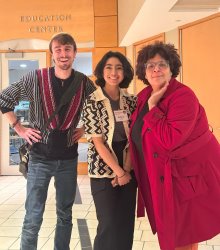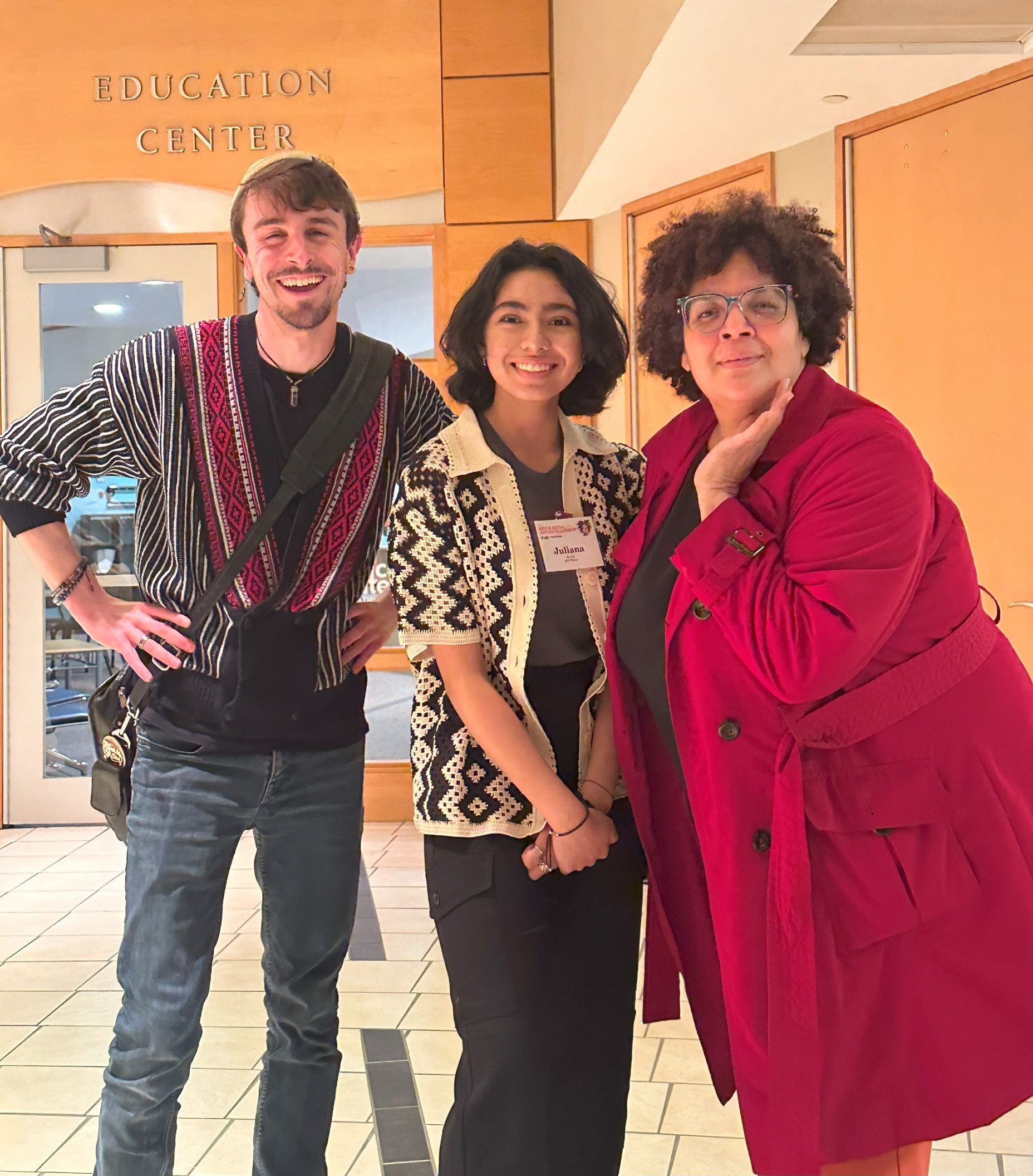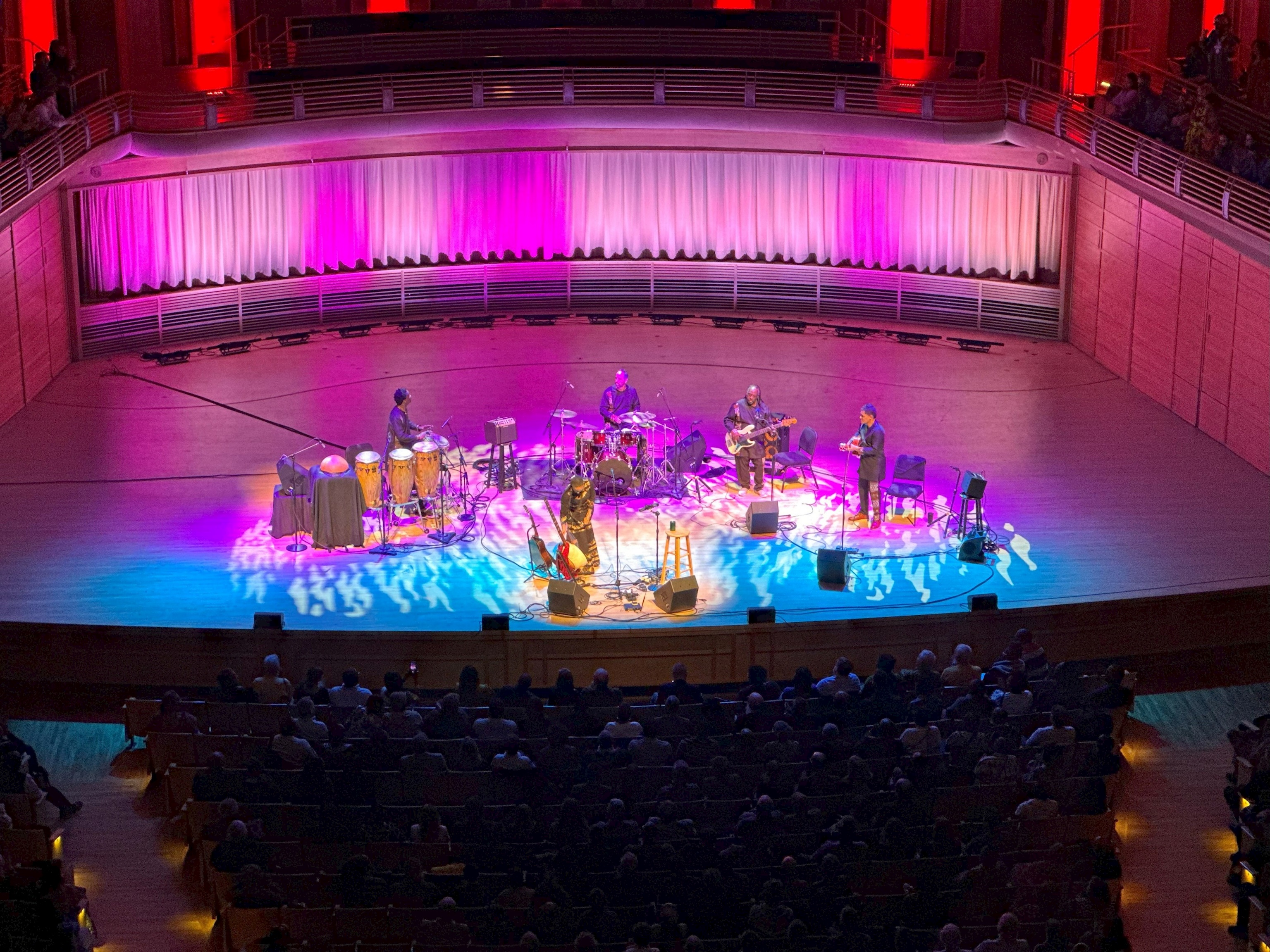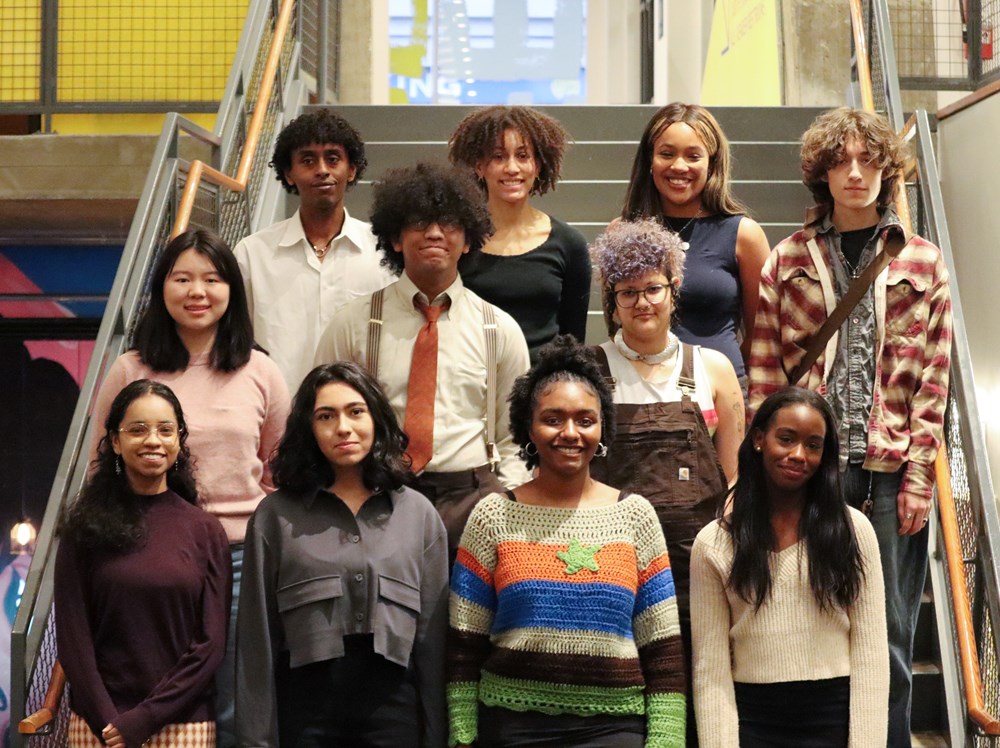

Juliana Dinarte ‘24 poses with the Co-Facilitators of the Fellowship, Tavish Forsyth and Blue Cavell-Allette. Photo provided.
Legacy student Juliana Dinarte ‘24 has jumped into life at Madeira with enthusiasm, pursuing exciting opportunities outside of the classroom in addition to her coursework and community building with the rest of her first-year class. Dinarte is part of the Arts and Social Justice Fellowship (ASJF) class of 2024.
This educational program, presented by Strathmore and the Woolly Mammoth Theatre Company, “supports youth leadership at the intersection of arts and social change. High schoolers from DC, Maryland, and Virginia attend performances at regional venues, engage in thematic workshops with mentors and their peers, and create final projects exploring issues of importance to them through media of their choosing.”
We sat down with Juliana to learn more about her experience so far and what she hopes to accomplish moving forward.
ASJF Class of 2024. Source: Strathmore.
Madeira: Could you describe the application process? How did you learn about the fellowship program and what type of application did you have to submit?
Juliana Dinarte: I learned about this fellowship from Ms. Mathews, Director of College Counseling at Madeira. The application required two essays, an interview process, and references. After acceptance to the program, the fellows commit to a six-month experience, held between January and July 2024, including biweekly workshops and events.
Madeira: What attracted you most to this fellowship program?
JD: The Arts and Social Justice Fellowship created by Strathmore and Woolly Mammoth Theatre Company combines the creative power of the arts with action, more specifically social activism, to challenge students to explore how they can use their unique artistic abilities to address social issues of importance and bring about social change. I was excited to learn more about social activism and how art can be a powerful tool to bring about social change.
The premise is fascinating and based on the idea that art and social change intersect in a powerful way. Important social, educational, political and economic movements have all been inspired and moved by unique artistic images and voices, and this fellowship is challenging a new generation of students to continue that path.
Madeira: What do you hope to learn and achieve by participating in the fellowship?
JD: I am learning a lot from the other fellows in our program. Many of the current fellows are poet laureates and performance artists. I am excited to see how they use their art to speak about social issues important to them. The fellowship is teaching me and the fellows how to lead by example with a focus on keeping everyone's voice in mind.
Another important lesson I have learned already from the fellowship is that the smallest details can have the biggest meaning when it comes to art and social experience. I hope I can finish this program having learned many lessons and new skills that will help me inspire change in a positive way.

Juliana’s view in the Strathmore for a performance by Sona Jobarteh, the first professional Gambian female player of the kora, a 21-stringed African harp. Juliana said, ”It was a phenomenal performance and a mind-blowing experience!” Photo provided.
Madeira: What has been the most impactful moment of the fellowship so far?
JD: This March, the fellows attended a performance of Where We Belong at the Folger Theatre. This performance was a one-woman autobiographical play by Madeline Sayet that explored the writer and performer's Indigenous ancestry and how it intersects with her affinity for Shakespeare's writing. In this play, the performer asks herself where and how her people and culture can continue to belong in a world that tried to displace them. In this autobiographical piece, the performer travels to England, where she plans to study Shakespeare. During her journey, questions arise about the past crimes of colonization in a world that is now moving toward trends of globalization. But still the performer is struggling with the idea that her Indigenous culture had their language and their artifacts stolen from them. She states that the land, however, is part of them and cannot be separated from their being. Many of the questions posed by the play are relevant to social justice problems today.
Madeira: How have your parents supported you during this process? How have they influenced your relationship with art and/or world issues?
JD: My family background is very diverse, and I have always been encouraged to see the human experience from a more open-minded viewpoint. My parents offer me an understanding of what their family experience was in their countries of origin, and I have always tried to see and understand how each person's experience is shaped by their origins and their personal experience. My parents are happy to see me participate in this program that allows me to combine my interests in art and social justice.
Madeira: Do you have an idea of what you might do for your final project?
JD: My project will be a visual art piece focusing on themes of feminism from a global perspective. I want to explore how societal standards affect our view and opinions of women. My installation will feature multiple layers of visual art. The superficial layers will depict the societal standards imposed on women, while the innermost layers of my piece will depict the true inner beauty of the female intellect and physical persona.
Madeira: Is there anything else you'd like to share about the experience?
JD: This fellowship has shown me that social justice can be implemented on large and small scales, and that opportunities to protect social justice occur everywhere in everyday life. We can all affect positive change with the decisions we make at home, at school, and at work. We can also plan and work hard to involve all voices as we advocate for social change on a larger scale.
The 2024 Fellows will present their final project showcase on Saturday, June 22, 2024, at 1 p.m. The presentation will be held in the AMP at Pike & Rose venue. For more information and to RSVP, please visit the event landing page.
#MadeAtMadeira #MadeiraCreativty #MadeiraLeads #MadeiraArts


.jpg&command_2=resize&height_2=85)




.jpeg&command_2=resize&height_2=85)













